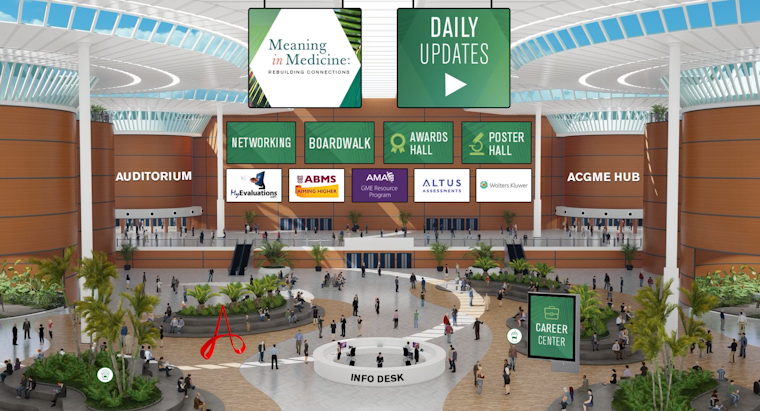The 2022 ACGME Annual Educational Conference kicked off today—appropriately, on National Doctors’ Day—with five pre-conferences, each tailored to a specific role in graduate medical education (GME). This is the second year all conference sessions, including pre-conferences, have been held virtually due to the COVID-19 pandemic. Yet, despite the virtual setting, the pre-conferences featured community, connection, and deep collective learning.
Pre-Conference for Residents and Fellows: Getting Back to Bedside: Enhancing Meaningful Physician-Patient Connections in GME
In a four-hour live pre-conference, the ACGME’s Back to Bedside Work and Advisory Group convened residents and fellows to explore where they find meaningful patient connections in their programs and develop a plan as well as the skills to implement the plan in their own institutions.
The pre-conference leveraged learnings and experiences from the ACGME’s Back to Bedside initiative, which helps residents and fellows build transformative projects that foster meaning and joy in work, allowing them to engage on a deeper level with what is at the heart of medicine: their patients. The initiative provides a competitive funding opportunity for resident- and/or fellow-led teams to innovate and creates a Learning Collaborative for the teams.
Pre-conference participants connected and collaborated with peers from across the country to share insights and ideas for reconnecting with patients in the face of competing demands. Topics included:
- Exploring meaningful patient connections through storytelling
- Examining “What’s in your Toolbox?” through discussions of change management and individual and team skills building
- Launching an idea, including creating an elevator pitch
- Communicating one’s vision
- Committing to change
Since the inception of Back to Bedside in 2017, the ACGME has funded more than 60 projects, engaging more than 150 residents and fellows in innovative projects to enhance their clinical experience and engage more fully with their patients and colleagues. The ACGME will announce the recipients of the third round of funding in May.
Learn more about Back to Bedside at https://www.acgme.org/backtobedside.
Coordinator Forum Pre-Conference
Considering this is the second consecutive virtual conference and how the ongoing pandemic continues affecting workplaces around the country, this year’s Coordinator Forum focused on adaptation and succeeding in changing and challenging environments under the theme of “Empowered and Thriving.”
Presentations focused on overcoming challenges and how to successfully navigate these two years of higher turnover, increased stress, and difficult conversations. Residency and fellowship coordinators, education managers, program administrators, and others dove into how to tackle and address the new realities created by the pandemic and gave helpful tips for moving forward.
Topics included:
- Dealing with department turnover
- How to make the most out of any situation
- Strategies for navigating conflict
- Managing up
- How and when to set boundaries
There were also some practical sessions delving into the requirements of a Program Evaluation Committee meeting and how to improve them, background and explanation of the TAGME certification exam, and discussion and insights to a program coordinator council and work groups.
ACGME/AOGME Osteopathic Recognition Pre-Conference
The ACGME/Assembly of Osteopathic Graduate Medical Educators (AOGME) pre-conference once again convened Directors of Osteopathic Education and osteopathic faculty members from programs with ACGME Osteopathic Recognition. The agenda included presentations on topics including:
- Highlighting the value of Osteopathic Recognition
- Innovative curricula that address the learning needs of both osteopathic and allopathic residents and fellows
- Milestones updates
- Tools and resources to prepare for a successful site visit
- A structural framework to help implement osteopathic manipulative treatment and Osteopathic Principles and Practices into a residency program
- An update from the AOGME Chair
An osteopathic faculty member and a designated osteopathic resident also described how a book club format has been successful in generating active discussions and inclusion of osteopathic philosophy.
Introductory Course for New Program Directors
Providing both the big picture of the ACGME, as well as specific tips and details, the pre-conference for new program directors hit all the marks for those new to running an ACGME-accredited residency or fellowship program.
“Ultimately, the ACGME is responsible to the public for assuring that everybody who trains in a program accredited by the ACGME, that program has met certain standards, including assessing the competence of that resident before they leave the program,” said Lynne Kirk, MD, chief accreditation officer at the ACGME. Supporting a residency program is a shared responsibility with the ACGME, she said.
The session included a variety of topics, including:
- The structure and format of the ACGME’s Common Program Requirements
- What data is collected during the accreditation process and why
- How the Milestones are and are not used to evaluate resident and fellow learning
- A walk-through for new program directors of the many moving pieces required for a well-run program
DIO 101: The Basics of Institutional Accreditation
Being the designated institutional official (DIO) for a Sponsoring Institution requires being able to manage a lot of moving parts and taking on responsibility for setting a strong foundation on which individual GME programs can thrive. This pre-conference, designed for DIOs who are new to the role or new to ACGME accreditation, provided important information on the institutional accreditation process.
The ACGME Institutional Requirements were recently revised and updated, and now include a required six-week parental/familial leave policy for residents and fellows; this requirement goes into effect in the upcoming academic year and was highlighted in the presentation.
“The @acgme’s 6-week paid parental leave requirement effective 7.1.22 (citable by 7.1.23) is an investment in #resident #wellness that is SO important. Well done!” tweeted session participant Dr. Louito C. Edje, DIO for University of Cincinnati College of Medicine. (Dr. Edje is a member of the ACGME Review Committee for Family Medicine.)
The session also addressed:
- The roles and responsibilities of a DIO
- The Institutional Review Committee’s key considerations when assessing an application or accreditation data
- How to successfully set up and manage a Graduate Medical Education Committee (GMEC)
- Common mistakes made during the application and accreditation processes and how to avoid them
Other Activities and Looking Ahead
Several networking, engagement, and entertainment activities also took place on this first day of the Annual Educational Conference. The full conference begins tomorrow, Thursday, March 31, and kicks off with morning well-being and attendee networking, followed by a day packed with enriching educational sessions and activities. Notably, the President’s Plenary, a presentation from ACGME President and Chief Executive Officer Thomas J. Nasca, MD, MACP, will stream from 10:00-11:00 a.m. Central. View the full conference agenda and other conference information on the conference registration site, and check back on the ACGME Blog during and after the conference for session updates and more!




